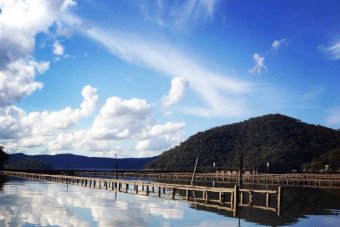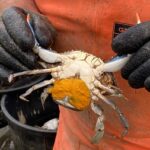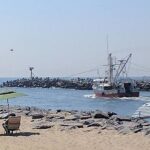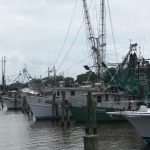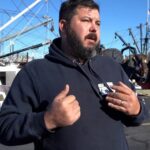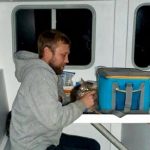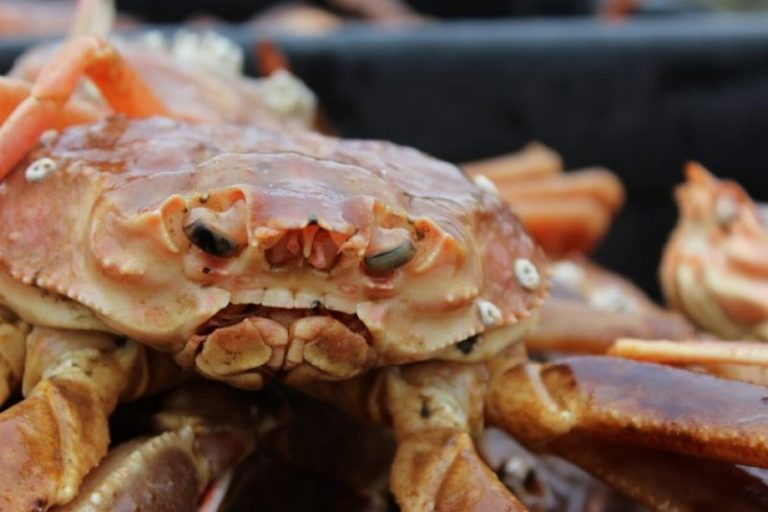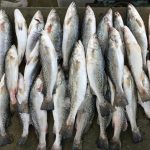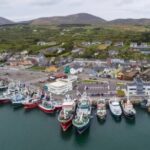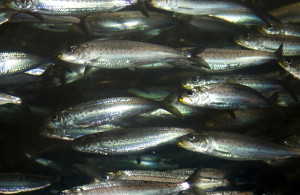Tag Archives: climate change

FISHY BUSINESS: A personal look at Scituate fishing
I have been writing Fishy Business about the commercial fishing industry and other maritime topics for a number of years and until now have never referred to myself. This column is different because our commercial fishing industry in Scituate is on the cusp of extinction; which is very personal to me. In this case, “commercial fishing” is referring to the finfish (or groundfish) fleet and the few boats that drag for shellfish. For now, the lobster fleet is doing well, but those businesses face their own perils to be discussed another time.,, There are many factors that are leading to the end of commercial fishing in Scituate and in many other small ports. By Christian Putnam >click to read<09:43
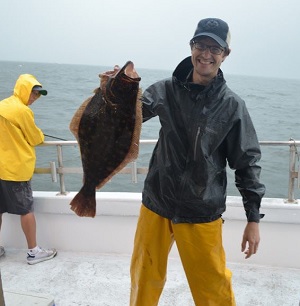
Climate change moving fish north, threatening turf wars, study says
World conflict is likely to increase over access to fisheries, as species move north in response to a warming ocean, according to a Rutgers University study published last week in the journal Science. “Seventy or more countries will likely have to start sharing with their neighbors” in coming decades, said lead author Malin Pinsky, including the U.S., Canada and Mexico.,, Gregory DiDomenico, executive director of the Garden State Seafood Association, said northern states such as New York argue they should now get a larger allotment for their fishing industries. He said allotments, which are set by the Atlantic States Marine Fisheries Commission and the Mid-Atlantic Fishery Management Council, are based on the history of landings by state. >click to read<23:32
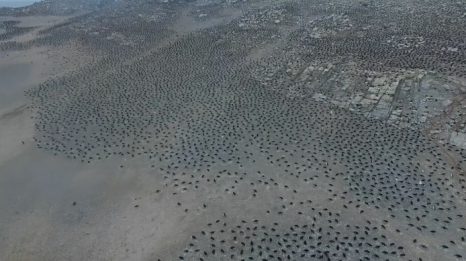
Remember when we were told “Penguins Don’t Migrate, they’re dying!” ? – never mind
WUWT readers may remember this story from last year, where Chris Turney, leader of the ill fated “ship of fools” Spirit of Mawson expedition that go stuck in Antarctic sea ice said: “Penguins Don’t Migrate, they’re dying!” and of course blamed the dreaded “climate change” as the reason. Of course three days later, Discover Magazine ran an article that suggested Turney was full of Penguin Poop. Well, seems there’s a surplus of Penguins now, in a place nobody thought to look, there’s an extra 1.5 million Penguins. From Woods Hole Oceanographic Institute. >click to read< 18:03
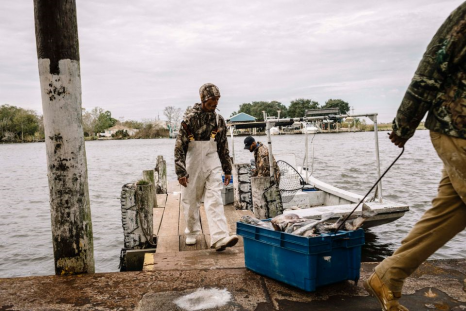
Our Drowning Coast: Left to Louisiana’s tides, Jean Lafitte fights for time
Out toward the horizon, a fishing village appears on a fingerling of land, tenuously gripping the banks of a bending bayou. Just two miles north is the jagged tip of a fortresslike levee, a primary line of defense for New Orleans, whose skyline looms in the distance. Everything south of that 14-foot wall of demarcation, including the gritty little town of Jean Lafitte, has effectively been left to the tides. Jean Lafitte may be just a pinprick on the map, but it is also a harbinger of an uncertain future. As climate change contributes to rising sea levels, threatening to submerge land from Miami to Bangladesh, the question for Lafitte, as for many coastal areas across the globe, is less whether it will succumb than when — and to what degree scarce public resources should be invested in artificially extending its life. Video, images>click to read<21:20
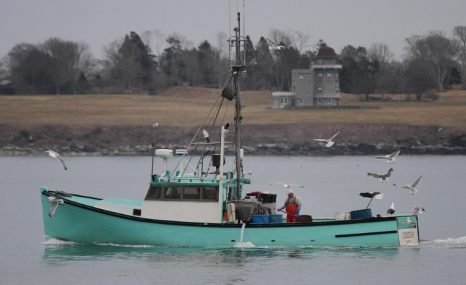
Fishermen: Narragansett Bay cleanup might be doing harm
Narragansett Bay is cleaner and clearer than it’s been in decades. But after huge strides in treating wastewater and controlling storm runoff, some are asking a question that would have been unthinkable just a few years ago about what is arguably Rhode Island’s most valuable natural resource: Is the Bay too clean? Fishermen are raising the issue after seeing steep declines in numbers of flounder, lobster and other species that were once so abundant that they formed the bedrock of their industry. It has gotten bad enough that lobsterman Al Eagles says that he and others now call the Bay “Chernobyl,” a reference to the site of the devastating Soviet-era nuclear disaster. click here to read the story 09:20
Waste Water Treatment Plants: Once home to thriving aquaculture, Great Bay is under great strain – You can see it in the lack of eelgrass beds that used to cover thousands of acres of tidal flats. These new treatment plants have filtered or poisoned most of the nutrients from the Piscataqua River and the many other rivers that serve their municipalities that dump their now super-treated effluent into the tidal water, now so sterile and lacking in nutrients and full of poison that plants and animals cannot survive. click here to read the story
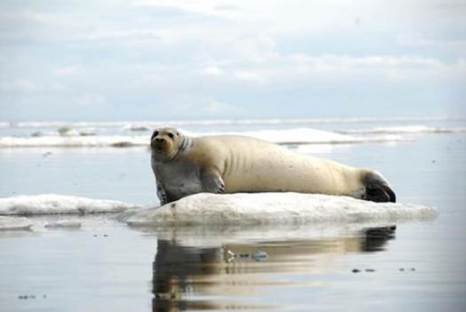
Listing the Bearded Seal as Threatened: A Disturbing Victory for Untestable Hypotheses and Flawed Models.
The Center for Biological Diversity also petitioned to list thriving populations of Bearded Seals as threatened or endangered by melting sea ice. In response to their petition, the National Marine Fisheries Service (NMFS) assembled a Bearded Seal Biological Review Team (BRT). The BRT’s report can be read here. Oddly, despite promoting a threatened designation, the BRT reports Bearded Seals have existed for over 1-2 million years, surviving far greater bouts of climate change as the earth bounced between several ice ages and warmer interglacials. An interesting (click here) read by Jim Steele 18:25:37

Scientists accused of scaremongering, ‘overheated claims’ with warning to humanity
A recent warning to humanity endorsed by thousands of scientists around the world includes “scaremongering” and “overheated” claims while ignoring much of the progress made in recent decades, some experts say. “It concerns me that the message from science is this doom-and-gloom scenario that just turns off about 75 per cent of people,” said Erle Ellis, an associate professor of geography and environmental systems at the University of Maryland, Baltimore County. “There’s a small percentage that loves the crisis narrative, and they just repeat it over and over to each other.” click here to read the story 10:03

New Southern New England lobster fishing rules on the way amid warming waters
New restrictions are coming to southern New England’s lobster fishery in an attempt to save the area’s population of the crustaceans, which has dwindled as waters have warmed. An arm of the interstate Atlantic States Marine Fisheries Commission voted on Tuesday to pursue new management measures to try to slow the decline of lobsters in the area. Management tools will include changes to legal harvesting size, reductions to the number of traps and seasonal closures to fishing areas. The board’s move was “a recognition that climate change and warming water temperatures play an increasingly role in lobster stocks, especially in southern New England,” said Tina Berger, a spokeswoman for the commission. click here to read the story 11:23
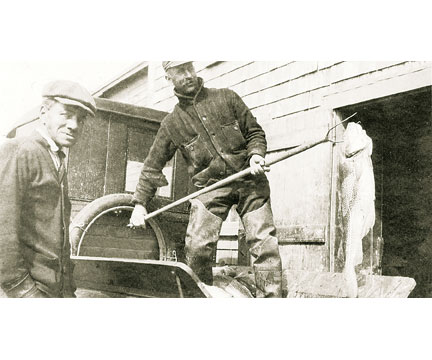
Could the Gulf of Maine’s Ground Fishery Rebound?
“The English had discovered living resources that would attract, shape, and sustain the communities of the coast of Maine for the next four centuries,” wrote journalist and historian Colin Woodard of the bounty that once existed in the Gulf of Maine in the 17th century in his book “The Lobster Coast.” “Early explorers were flabbergasted by the largesse of the Gulf of Maine, a semienclosed sea stretching from Cape Cod to Nova Scotia. They saw great pods of whales, acres of thrashing tuna, vast schools of salmon, herring and mackerel, clouds of puffins and terns, shoals of mussels and oysters, vast mudlfats infested with fat clams, cod and haddock biting at the hook, and enormous lobsters foraging in the rockweed. The waters off England and France seemed barren by comparison.” As Woodard noted, the geology and climate of the Gulf of the Maine with its 7,500-mile coastline made the area perfectly suited for a thriving fishery — a “fertile oasis in a world ocean that is, ecologically speaking, largely desert.” click here to read the story 09:27
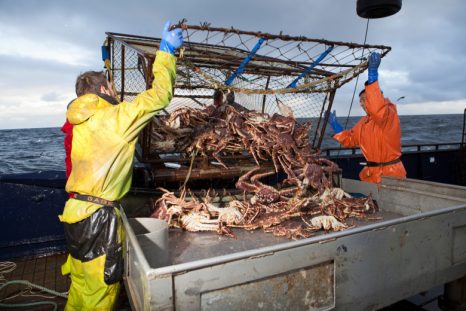
‘Deadliest Catch’ Faces Its Own Extinction – The crabs are missing in the Bering Sea, and the series may soon have nothing to film.
If Discovery’s “Deadliest Catch” is in trouble, it’s climate change – not ratings – that may hasten the show’s demise. Over the last year, temperatures rose about four degrees in the Bering Sea, which is 50 times the global average. As filming began for the 13th season of “Deadliest Catch,” which premieres Tuesday night, the show’s fishermen had to contend with a serious problem: With warming waters, the crabs have moved elsewhere. “The first thing that you need in order to film a show about crab fishing are the crabs,” said executive producer R. Decker Watson, Jr. “If the crabs don’t show up, then we’re all out of business.” The Alaska Department of Fish and Game sets an annual quota system on crab fishing, depending on a survey they take in the spring and summer. This past year, they found that half the crab was missing, and quotas were cut across the board.“We didn’t know if we were even going to be on the water long enough to film the 20 hours of ‘Deadliest Catch’ for the season,” Watson said. “It became a much more difficult fight for each skipper… It worries me for the future of the fishermen, they’re really having to fight to save their way of life. But it makes for great television.” Indeed, the fishermen’s struggle became a major part of the story this season. click here to read the story 20:03
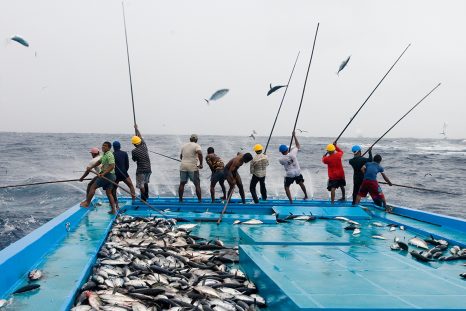
Ready for this one? Sustainable tuna fishing is bad for climate
What’s good for the ocean might be bad for the planet. Fishing boats that target specific species, leaving others free to swim away, use more fuel than vessels intent on simply scooping up all the fish in their vicinity. Eco-label initiatives and programmes like Monterey Bay Aquarium’s Seafood Watch, meant to help hungry diners quickly select sustainably caught seafood, have been gathering public support in recent years, says Brandi McKuin at the University of California Merced. While those guides are helpful, their standards focus mainly on fishing-based factors, like leaving enough fish in the ocean to avoid decimating the population, and reducing the number of accidently caught fish, or bycatch, McKuin says. Other impacts, including the greenhouse gas emissions generated by using different types of fishing gear, are often overlooked. “If we’re including climate change in the sustainability criteria, it changes things,” McKuin says. Read the story here 13:31
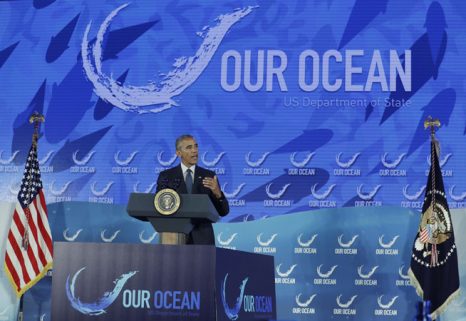
Trump team wants State Dept. to disclose how much of your money it sends to international environmental groups
Donald Trump’s presidential transition team has asked State Department officials to disclose how much money it provides each year to international environmental groups. It’s the latest example of how the incoming administration is reassessing the U.S. government’s approach to tackling climate change and other environmental priorities. As part of a list of questions posed last week to the department’s Bureau of Oceans and International Environmental and Scientific Affairs, according to multiple people familiar with the matter, the Trump landing team asked, “How much does the Department of State contribute annually to international environmental organizations in which the department participates?” Although some State Department officials found the question about funding for environmental groups troubling, one senior official, speaking on the condition of anonymity because transition communications are confidential, said the requests from the transition team have been appropriate. “They are legitimately looking at the organization of things here at Foggy Bottom,,, Read the rest here 16:16
Opinion: Lawsuit against wind farm is shortsighted
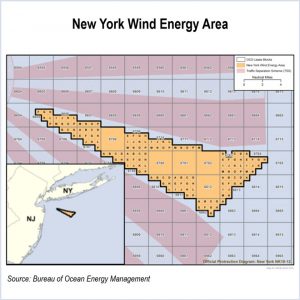 Commercial fishing interests are very shortsighted in filing a NIMBY lawsuit against the wind farm area off Long Island [“Suit over wind farm auction,” News, Dec. 9]. Deepwater Wind, the developer of the new Block Island wind farm and one likely bidder to develop the Long Island site, has demonstrated that the construction of an offshore wind farm can be managed in cooperation with a variety of interest groups and done in a way to avoid harming wildlife. By suing to stop or stall the leasing of an area for urgently needed renewable energy, the fishing groups ignore the very real crisis of climate change. Climate change imperils the world’s oceans, and without building offshore wind power, the damage from climate change to the ecosystems that support commercial fishing will more likely lead to the collapse of fisheries because of warming and acidifying oceans. Elizabeth Sabbatini, Old Brookville Link 08:25
Commercial fishing interests are very shortsighted in filing a NIMBY lawsuit against the wind farm area off Long Island [“Suit over wind farm auction,” News, Dec. 9]. Deepwater Wind, the developer of the new Block Island wind farm and one likely bidder to develop the Long Island site, has demonstrated that the construction of an offshore wind farm can be managed in cooperation with a variety of interest groups and done in a way to avoid harming wildlife. By suing to stop or stall the leasing of an area for urgently needed renewable energy, the fishing groups ignore the very real crisis of climate change. Climate change imperils the world’s oceans, and without building offshore wind power, the damage from climate change to the ecosystems that support commercial fishing will more likely lead to the collapse of fisheries because of warming and acidifying oceans. Elizabeth Sabbatini, Old Brookville Link 08:25
Four New Papers Link Solar Activity, Natural Ocean Cycles To Climate – And Find Warmer Temps During 1700s, 1800s
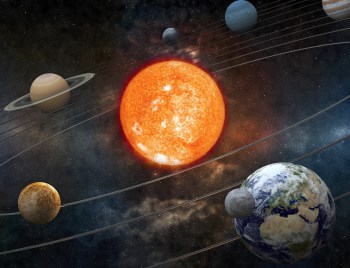 As of mid-September, there have already been 77 peer-reviewed scientific papers authored by several hundred scientists linking solar activity to climate change. There were 43 as of the end of June, as seen here. In other words, there have been 34 more papers linking solar forcing to climate change made available online just since July. This publication rate for 2016 is slightly ahead of the pace of published papers linking solar forcing to climate change for 2015 (95 Solar-Climate papers ) and 2014 (93 Solar-Climate papers). At this rate, it is likely that a list of 300+ scientific papers linking solar forcing to climate change will have been made available between 2014 and 2016. In addition, there have already been 41 papers published in science journals this year linking natural oceanic oscillations (i.e., ENSO, NAO, AMO, PDO) to climate changes. There were 27 such papers as of the end of June. The solar-ocean oscillation climate connection has gained widespread acceptance in the scientific community. For example, see “35 New Scientific Publications Confirm Ocean Cycles, Sun Are the Main Climate Drivers” Read the rest here 15:36
As of mid-September, there have already been 77 peer-reviewed scientific papers authored by several hundred scientists linking solar activity to climate change. There were 43 as of the end of June, as seen here. In other words, there have been 34 more papers linking solar forcing to climate change made available online just since July. This publication rate for 2016 is slightly ahead of the pace of published papers linking solar forcing to climate change for 2015 (95 Solar-Climate papers ) and 2014 (93 Solar-Climate papers). At this rate, it is likely that a list of 300+ scientific papers linking solar forcing to climate change will have been made available between 2014 and 2016. In addition, there have already been 41 papers published in science journals this year linking natural oceanic oscillations (i.e., ENSO, NAO, AMO, PDO) to climate changes. There were 27 such papers as of the end of June. The solar-ocean oscillation climate connection has gained widespread acceptance in the scientific community. For example, see “35 New Scientific Publications Confirm Ocean Cycles, Sun Are the Main Climate Drivers” Read the rest here 15:36
NOAA research ecologist suggests, As climate change alters the oceans, what will happen to Dungeness crabs?
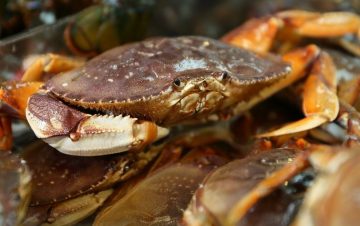 In my day job as a research ecologist with the National Oceanic and Atmospheric Administration’s Northwest Fisheries Science Center, I study how changes in seawater’s acidity from absorbing carbon dioxide in the air, referred to as ocean acidification may affect the success of recreational crabbers like me and the fortunes of the crabbing industry. Contrary to early assumptions that acidification was unlikely to have significant effects on Dungeness crabs, we found in a recent study that the larvae of this species have lower survival when they are reared in the acidified ocean conditions that we expect to see in the near future. Our findings have sobering implications for the long-term future of this US$170 million fishery. Ocean acidification is a global phenomenon,,, Read the rest here 11:03
In my day job as a research ecologist with the National Oceanic and Atmospheric Administration’s Northwest Fisheries Science Center, I study how changes in seawater’s acidity from absorbing carbon dioxide in the air, referred to as ocean acidification may affect the success of recreational crabbers like me and the fortunes of the crabbing industry. Contrary to early assumptions that acidification was unlikely to have significant effects on Dungeness crabs, we found in a recent study that the larvae of this species have lower survival when they are reared in the acidified ocean conditions that we expect to see in the near future. Our findings have sobering implications for the long-term future of this US$170 million fishery. Ocean acidification is a global phenomenon,,, Read the rest here 11:03
Obama brings fresh attention to an expanded marine sanctuary (and the fishermen it hurts)
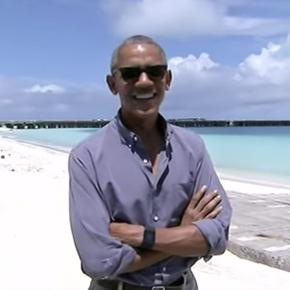 Yesterday, while visiting Hawaii’s Midway Atoll, President Obama officially made the size of a marine monument twice the size of Texas while highlighting his Climate Change commitment. The monument’s new size has angered local fishermen and Native Hawaiians. The monument, created by President George W. Bush in 2006, puts more land and waters off limits to local fishermen and recreation, and Obama’s critics are calling his actions heavy-handed. The monument is now the largest protected marine Environment in the world or roughly 3.5 times the size of California. A native of Hawaii, Obama used his executive power to expand the Papahānaumokuākea Marine National Monument, making large swaths of fertile fishing grounds off-limits to fishermen. That means they now have to travel at least four times further out to sea to catch fish like tuna, a costly adventure that actually emits more greenhouse gas emissions because of the increased travel time. Hawaiians not only consume three times more fish than landlocked Americans but fishing is a major source of local commerce. Read the rest here 15:03
Yesterday, while visiting Hawaii’s Midway Atoll, President Obama officially made the size of a marine monument twice the size of Texas while highlighting his Climate Change commitment. The monument’s new size has angered local fishermen and Native Hawaiians. The monument, created by President George W. Bush in 2006, puts more land and waters off limits to local fishermen and recreation, and Obama’s critics are calling his actions heavy-handed. The monument is now the largest protected marine Environment in the world or roughly 3.5 times the size of California. A native of Hawaii, Obama used his executive power to expand the Papahānaumokuākea Marine National Monument, making large swaths of fertile fishing grounds off-limits to fishermen. That means they now have to travel at least four times further out to sea to catch fish like tuna, a costly adventure that actually emits more greenhouse gas emissions because of the increased travel time. Hawaiians not only consume three times more fish than landlocked Americans but fishing is a major source of local commerce. Read the rest here 15:03
Pacific Salmon Foundation – Health of salmon not determined by catch counts
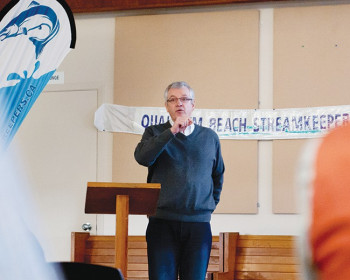 B.C. fishermen may have to console themselves with limited harvest of salmon in the coming years, but the long-term prospects for wild Pacific salmon are not as dire as some critics claim, the head of the Pacific Salmon Foundation told members of the Qualicum Beach Streamkeepers during their annual general meeting Saturday at St. Stephen’s United Church. “If you’re interested in the future of salmon, it’s better than indicated by what people talk about in the media,” said Brian Riddell, CEO and president of the PSF and a former staffer with Fisheries and Oceans Canada. “In the past, people have been fixated on catch as the measure of abundance and health of salmon. But the health of salmon is not determined by the catch. It’s determined by the amount of fish that come back and spawn after the catch.” Read the rest here 13:31
B.C. fishermen may have to console themselves with limited harvest of salmon in the coming years, but the long-term prospects for wild Pacific salmon are not as dire as some critics claim, the head of the Pacific Salmon Foundation told members of the Qualicum Beach Streamkeepers during their annual general meeting Saturday at St. Stephen’s United Church. “If you’re interested in the future of salmon, it’s better than indicated by what people talk about in the media,” said Brian Riddell, CEO and president of the PSF and a former staffer with Fisheries and Oceans Canada. “In the past, people have been fixated on catch as the measure of abundance and health of salmon. But the health of salmon is not determined by the catch. It’s determined by the amount of fish that come back and spawn after the catch.” Read the rest here 13:31
Gulf warming study based on bad science, stakeholders say
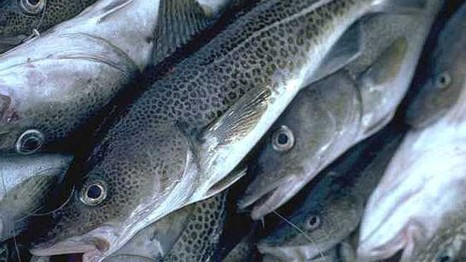 The study, performed by the Gulf of Maine Research Institute and appearing in the journal Science, concluded the Gulf of Maine’s surface water is warming more rapidly than 99.9 percent of the rest of the world’s oceans and that climate change is a contributing factor to the demise of the cod stock. “My first question was whether any part of the study started out to understand the true status of Gulf of Maine cod or if they just assumed that the data from the assessment — which we contend is consistently wrong — is fact,” said Vito Giacalone, policy director for the Gloucester-based Northeast Seafood Coalition. “I was told it was the latter.” Read the rest here 08:39
The study, performed by the Gulf of Maine Research Institute and appearing in the journal Science, concluded the Gulf of Maine’s surface water is warming more rapidly than 99.9 percent of the rest of the world’s oceans and that climate change is a contributing factor to the demise of the cod stock. “My first question was whether any part of the study started out to understand the true status of Gulf of Maine cod or if they just assumed that the data from the assessment — which we contend is consistently wrong — is fact,” said Vito Giacalone, policy director for the Gloucester-based Northeast Seafood Coalition. “I was told it was the latter.” Read the rest here 08:39
From the UBC “think tank” – B.C. salmon prices set to skyrocket with climate change
 The report Out of Stock predicts that by 2050 there could be a 21 per cent decline in sockeye, a 10 per cent decline in chum, and a 15 per cent decline in sablefish. “This is a really tangible way for people to understand the impact of climate change,” says Rashid Sumaila, one of the study’s authors who has been working with the UBC’s fisheries research unit for over 20 years. Alrighty then! Read the rest here 10:40
The report Out of Stock predicts that by 2050 there could be a 21 per cent decline in sockeye, a 10 per cent decline in chum, and a 15 per cent decline in sablefish. “This is a really tangible way for people to understand the impact of climate change,” says Rashid Sumaila, one of the study’s authors who has been working with the UBC’s fisheries research unit for over 20 years. Alrighty then! Read the rest here 10:40
Climate change impact on lobster already visible, Lobsters struggle for breath in warming ocean
 Warmer water temperatures and more acidic conditions seem to make lobster larvae grow more slowly, preliminary studies have found. A researcher at the University of Maine is collaborating with a professor at the University of Prince Edward Island on what impact climate change could have on lobster. University of Maine Masters student Jessica Waller is trying to figure out why the larvae are growing more slowing, by testing them in the water conditions expected 85 years from now due to climate change. Read the rest here 10:26
Warmer water temperatures and more acidic conditions seem to make lobster larvae grow more slowly, preliminary studies have found. A researcher at the University of Maine is collaborating with a professor at the University of Prince Edward Island on what impact climate change could have on lobster. University of Maine Masters student Jessica Waller is trying to figure out why the larvae are growing more slowing, by testing them in the water conditions expected 85 years from now due to climate change. Read the rest here 10:26
Climate change, acid oceans: NOAA research priorities
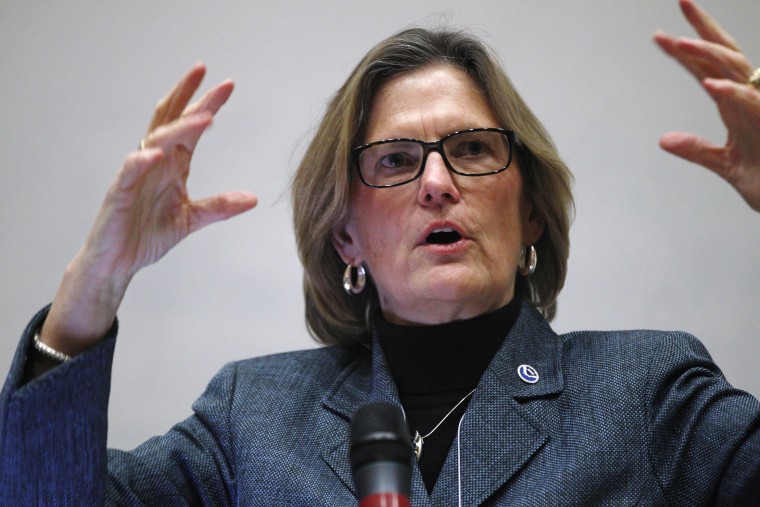 The changing climate and chemistry of our oceans is definitely on radar screens of federal planet watchers. That’s the assurance of Kathryn Sullivan, director of the National Oceanic and Atmospheric Administration. I don’t need to tell Alaskans – you are living it, you see it all around you. And the consequences that have societally, economically, ecologically you all are living it every day. Sullivan calls NOAA the nation’s environmental intelligence agency. (Really?) Audio, and read the rest here 17:47
The changing climate and chemistry of our oceans is definitely on radar screens of federal planet watchers. That’s the assurance of Kathryn Sullivan, director of the National Oceanic and Atmospheric Administration. I don’t need to tell Alaskans – you are living it, you see it all around you. And the consequences that have societally, economically, ecologically you all are living it every day. Sullivan calls NOAA the nation’s environmental intelligence agency. (Really?) Audio, and read the rest here 17:47
Fishermen’s Views of a Changing Ocean – Is it your view?
But for commercial fishermen,*  is not a future economic problem: It is a problem right now, and it is costing fisherman both income and jobs. Is it? From the pdf version, The breakdown of those interviewed. 146 ground fishermen, 163 Mass lobstermen, = approx. 10% of Mass fishermen and lobstermen combined. 262 Me. lobstermen = approx. 5% Maine lobstermen. Read the rest here pdf version here with interesting citations, Pauly, Pappalardo, etc. 17:43
is not a future economic problem: It is a problem right now, and it is costing fisherman both income and jobs. Is it? From the pdf version, The breakdown of those interviewed. 146 ground fishermen, 163 Mass lobstermen, = approx. 10% of Mass fishermen and lobstermen combined. 262 Me. lobstermen = approx. 5% Maine lobstermen. Read the rest here pdf version here with interesting citations, Pauly, Pappalardo, etc. 17:43
Climate change driving fish north, Rutgers research shows
 In New Jersey, fishermen have already adapted to the realities of the shift, said Greg DiDomenico, the executive director of the Garden State Seafood Association. “The industry has been adapting to this for the last 20 years. They’re seeing these things in real-time,” said DiDomenico. “Fishermen are fishing where the fish are.” Read the rest here 09:43
In New Jersey, fishermen have already adapted to the realities of the shift, said Greg DiDomenico, the executive director of the Garden State Seafood Association. “The industry has been adapting to this for the last 20 years. They’re seeing these things in real-time,” said DiDomenico. “Fishermen are fishing where the fish are.” Read the rest here 09:43
Center for Biological Diversity to sue NMFS to Protect Disappearing Pinto Abalone From Ocean Acidification, Climate Change and Poaching
 Sustainable. The tax drain of US taxpayers that pay for NMFS, CBD’s tax except status, and for frivolous lawsuits brought forth by the Bender and Bender of Environmental NGO’s. Apparently these nuts believe that NMFS should be sued over Ocean Acidification, Climate Change and Poaching? Read the press release here 21:42
Sustainable. The tax drain of US taxpayers that pay for NMFS, CBD’s tax except status, and for frivolous lawsuits brought forth by the Bender and Bender of Environmental NGO’s. Apparently these nuts believe that NMFS should be sued over Ocean Acidification, Climate Change and Poaching? Read the press release here 21:42
Climate change forcing fish stocks north: study
 A study has produced the strongest evidence yet that climate change is forcing hundreds of valuable fish species toward the poles. The paper, published in the ICES Journal of Marine Science on Friday, concludes that Canadian and Arctic waters may end up with more species and greater abundance. Read the rest here Wonder if the CLF/Pew Eco Quackeroos even look at this. 17:43
A study has produced the strongest evidence yet that climate change is forcing hundreds of valuable fish species toward the poles. The paper, published in the ICES Journal of Marine Science on Friday, concludes that Canadian and Arctic waters may end up with more species and greater abundance. Read the rest here Wonder if the CLF/Pew Eco Quackeroos even look at this. 17:43
In Maine, climate change is taking a toll
 On Sheepscot Bay off Georgetown, Jim McMahan prodded his old lobster boat through the smooth waters, methodically lowering a mechanical winch to check on his hundreds of traps. But he has noticed some disturbing trends in recent years. Nearly every day now, he pulls up scores of lobsters with diseased shells. Another concern is the arrival of new, aggressive predators from the south. Read the rest here 10:34
On Sheepscot Bay off Georgetown, Jim McMahan prodded his old lobster boat through the smooth waters, methodically lowering a mechanical winch to check on his hundreds of traps. But he has noticed some disturbing trends in recent years. Nearly every day now, he pulls up scores of lobsters with diseased shells. Another concern is the arrival of new, aggressive predators from the south. Read the rest here 10:34
In 100 Years, Maryland’s Crab Cakes Might Be Shrimp Cakes
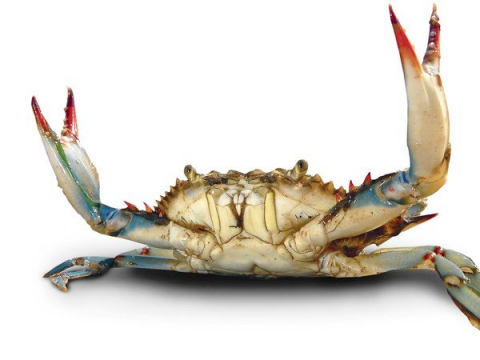 For centuries, the Chesapeake Bay has been a natural seafood factory along the East Coast, and that wealth of marine resources has shaped the area’s food culture and history—a 2011 Garden & Gun article referred to Maryland crab cakes as “practically a religion.” Seafood production also represents a critical portion of the Chesapeake Bay’s economic backbone. Read the rest here 10:17
For centuries, the Chesapeake Bay has been a natural seafood factory along the East Coast, and that wealth of marine resources has shaped the area’s food culture and history—a 2011 Garden & Gun article referred to Maryland crab cakes as “practically a religion.” Seafood production also represents a critical portion of the Chesapeake Bay’s economic backbone. Read the rest here 10:17New Brunswick: Research links clam behaviour to climate change
 New research is linking clam behaviour to climate change. That shift in behaviour could be contributing to increasingly low soft-shell clam populations on the Bay of Fundy. Researcher Jeff Clements at the University of New Brunswick in Saint John says clams tend to refuse to burrow into ocean sediment that has high acidity Read more here 07:18
New research is linking clam behaviour to climate change. That shift in behaviour could be contributing to increasingly low soft-shell clam populations on the Bay of Fundy. Researcher Jeff Clements at the University of New Brunswick in Saint John says clams tend to refuse to burrow into ocean sediment that has high acidity Read more here 07:18
Climate Change Threat To New England Fisheries
 WGBH News’ Stephanie Leydon reports, in part two of our FOCUS report on climate change, there is evidence that warming waters are impacting one of the region’s most vital natural resources: seafood. GUESTS- John Bullard – National Marine Fisheries Service. Jackie Odell – Northeast Seafood Coalition. Watch the video here 07:25
WGBH News’ Stephanie Leydon reports, in part two of our FOCUS report on climate change, there is evidence that warming waters are impacting one of the region’s most vital natural resources: seafood. GUESTS- John Bullard – National Marine Fisheries Service. Jackie Odell – Northeast Seafood Coalition. Watch the video here 07:25






